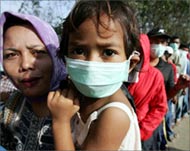Gulf countries increase tsunami aid
After growing criticism of the Middle East oil kingdoms’ lack of response to the tsunami disaster, several Gulf governments have increased their monetary donations.

The increase from countries such as Kuwait, Saudi Arabia and the United Arab Emirates came only after a debate over whether governments were damaging their image by failing to make donations.
Oil-rich Gulf Arab states, home to millions of Asian workers, have so far pledged $85 million to victims of the Asian tsunami disaster despite reaping six times as much in crude revenues daily.
All the Gulf states need to do is donate one day’s equivalent of their oil income, a Kuwaiti commentator suggested on Wednesday.
Kuwait may have raised its aid pledge from $1 million to $10 million, but this “still is a humble amount compared to the magnitude of the catastrophe”, Shamlan al-Issa wrote in the daily As-Siyassah.
Competitive aid
Australia on Wednesday led the table of major governmental pledges – including loans and grants – by promising $764 million. It was followed by Germany’s $668 million, Japan’s $500 million and the United States’ $350 million.
 |
|
Indonesian survivors queue to |
What is shaping up as one of the largest aid efforts in history has so far raised about $4 billion.
Jan Egeland, the UN’s emergency relief coordinator, cautioned that nations must live up to their public pledges when the time comes to pay up.
“Come with the money you pledge,” Egeland said, recalling the Bam earthquake in Iran at the end of 2003 which got significant promises of help, many of which were never received.
Saudi Arabia, the world’s top oil exporter, started with a pledge of $10 million before announcing on Tuesday that it was tripling that amount and organising a telethon to raise more funds.
Added to Kuwait’s $10 million, the United Arab Emirates’ $20 million and gas-rich Qatar’s $25 million, the total pledges by the four oil producers reached $85 million, compared to some $500 million a day in oil revenues.
“The rich Gulf states usually don’t give big amounts to victims of natural disasters, perhaps because they have not gone through such plights themselves,” commented Jamal Marhun, a Bahraini employee.
Government criticised
“Let’s admit that Kuwait’s donation was too small compared to its humanitarian status and the size of the catastrophe,” Nabil al-Fadhel wrote on Monday in the Kuwaiti newspaper al-Rai al-Aam, reminding Kuwaitis of the services of Asian workers in the emirate.
|
“The rich Gulf states usually don’t give big amounts to victims of natural disasters, perhaps because they have not gone through such plights themselves” Jamal Marhun, |
In Kuwait and other Gulf countries, many organisations – including government-backed ones such as Red Crescent societies – have been collecting and shipping donations to tsunami victims.
But Kuwait appears to be the only place so far where the press has stuck its neck out to criticise the governments’ performance.
The head of the foreign affairs committee in Saudi Arabia’s appointed Shura Council, Bandar al-Oyban, defended the kingdom’s response to the tragedy, saying it was “among the first countries” to deliver relief aid.
“Even larger countries donated little aid straight after the disaster took place, but when the real size of the calamity transpired, aid increased,” he said.
Riyadh would “doubtlessly cooperate in any programme for longer term aid” to the affected countries, he added.
A UAE official, speaking anonymously, also underscored the ongoing and multi-faceted nature of the assistance his country was offering.
 |
|
Millions of survivors are in need |
For instance, he said, the UAE donated 100 emergency beds “within minutes” of being asked by German diplomats when a German hospital ship destined for the victims stopped at one of its ports last week.
Both the Emirati official and the Saudi Shura member insisted that their countries offered aid on a humanitarian basis that had nothing to do with race or religion.
But Arab newspaper editor Abdul Bari Atwan was unconvinced.
“We Arabs failed in peace as we did in war. We failed in all tests of democracy and human rights. Here we are, registering a new failure on the humanitarian front,” said Atwan, who edits the London-based al-Quds al-Arabi.